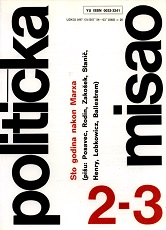Marxovo određenje privatnog vlasništva i države u spisima između 1844. i 1846.
The Definition of Private Property and of the State in Marx's Writing Between 1844 and 1846
Author(s): Nenad ZakošekSubject(s): Political Sciences, Labor relations, Political economy, 19th Century
Published by: Fakultet političkih znanosti u Zagrebu
Keywords: Definition; Private Property and of the State; Marx's Writing; 1844 and 1846;
Summary/Abstract: Faced with difficulties in describing the bourgeois society, and particularly in providing u coherent definition of the concept of private property and in deriving from it the other categories of the bourgeois society and state, Marx embarks in 1844 on a systematic study of political economy. This brings about a methodological turning-point in his analysis of bourgeois society and state, caused by the realisation that labour is the essence of private property. Proceeding from this, Marx redefines the central concepts of his analysis. — Private property is analyzed, in the first place, as the relation between private owners, who exchange their products in the market: in this relationship private owners mutually instrumentalize their needs, with the result that the means of the exchange relationship is ultimately established as an alien force, to which their social being is subordinated (Marx was later to analyze this phenomenon as "reification", or the "fetish character of commodity"). — In the (historically induced) conditions of separation between factors of production (land, capital and labour) a private¬ -property relationship of exchange is established as a specific basic production relation of the modern age: the relation between the owner of capital and the owner of labour. The substance of this relationship is the process of alienation of labour, which produces at the same time the dehumanisation of the modern class of labourers (and thereby of the entire modem age) as well as the conditions for its own abolition. — The analysis of private property in terms of alienation of labour provides the basis for a new concept of history, which is looked upon as the practical-productive self-establishment of man induced by alienation. — The modern state no longer appears as the sphere of generic (general, free) existence of man but simply as an instrument of the community of private owners based on the market and on production (bourgeois society as a system of private property relations). Thus "demystified", it is of only marginal importance for Marx, who focuses his main theoretical scrutiny on the analysis of the modern (capitalist) mode of production of life.
Journal: Politička Misao
- Issue Year: XX/1983
- Issue No: 02+03
- Page Range: 24-34
- Page Count: 11
- Language: Croatian

